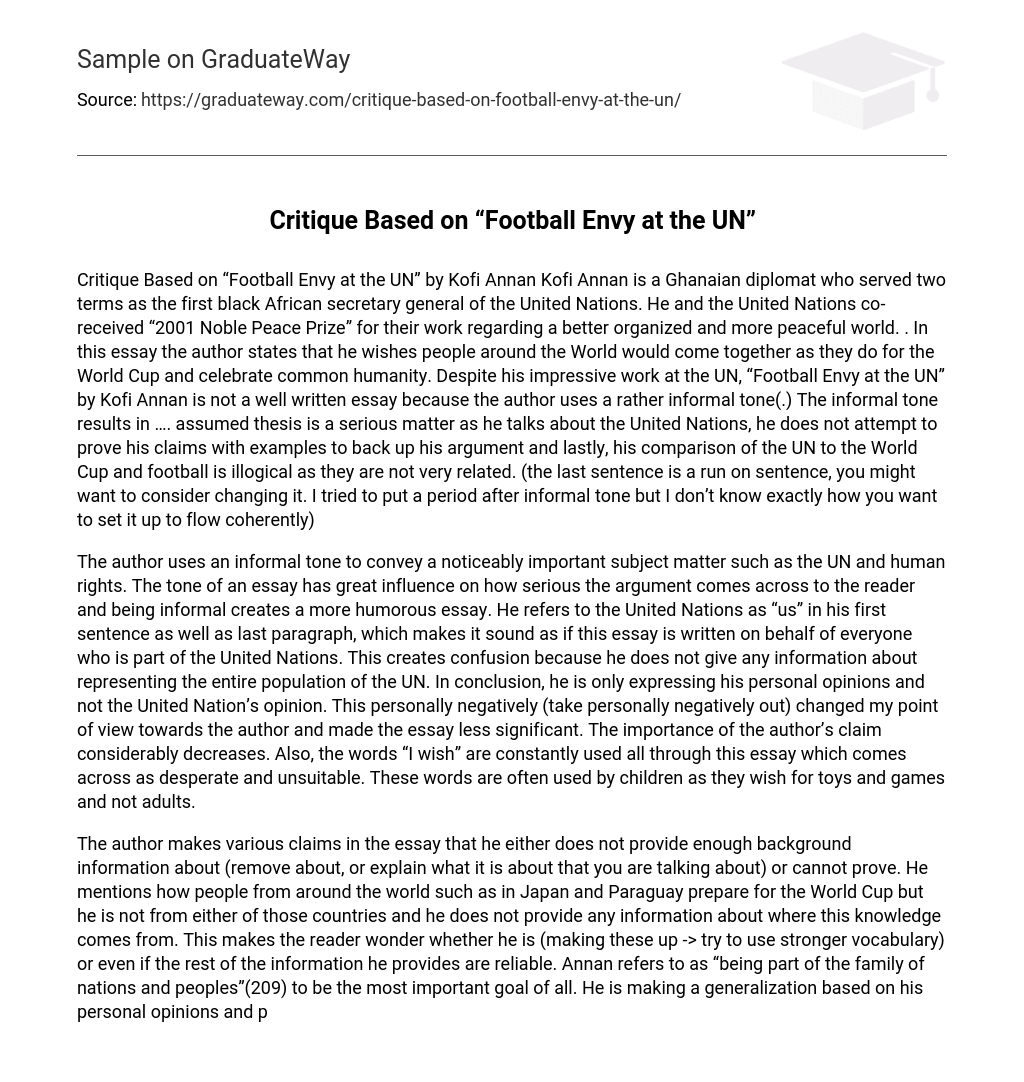Kofi Annan, a Ghanaian diplomat, served as the first black African secretary general of the United Nations for two terms. Alongside the United Nations, he was honored with the “2001 Nobel Peace Prize” for his endeavors in advancing a more peaceful and well-structured world. In his essay titled “Football Envy at the UN,” Kofi Annan expresses a desire for global citizens to unite and celebrate their shared humanity, much like they do during the World Cup. Despite being critiqued by some for its informal style, Kofi Annan’s impressive achievements at the UN cannot be overlooked.
The informal tone of the text implies that the assumed thesis is a serious matter. However, the author fails to provide examples that support his argument about the United Nations. Additionally, his comparison of the UN to the World Cup and football is illogical, as these two topics are not closely related. (It may be helpful to consider breaking up the last sentence for better coherence.)
The author of the essay adopts a casual tone when discussing the United Nations and human rights, which injects humor into the text. This lightheartedness significantly affects how readers view the argument’s credibility. Moreover, by referring to the United Nations as “us” at both the beginning and end, it generates ambiguity about whether he represents all members or not.
To summarize, the essay expresses the author’s personal opinions and does not have the endorsement of the United Nations. This altered my perception of the author and diminished the significance of their argument. The claim put forth by them loses considerable importance. Additionally, the frequent use of “I wish” in the essay appears desperate and inappropriate, as it is more commonly used by children desiring toys and games rather than adults.
In the essay, the author presents several claims without providing adequate background information or supporting evidence. For instance, he mentions the preparations for the World Cup in countries like Japan and Paraguay, yet fails to explain the source of his knowledge on these matters. This lack of credibility raises doubts about whether he is fabricating these statements or if his other information can be trusted.
According to Annan (209), the utmost priority is to be included in the collective of nations and peoples. This statement, based on his personal convictions, may hold different levels of truth for each reader.
In conclusion, it is not suitable to compare the United Nations to the World Cup. The absence of specific information regarding the UN’s work hinders a meaningful comparison without comprehending their operations. Despite widespread familiarity with the United Nations, uncertainty may persist regarding its true role.
The accusation of bribery has long plagued FIFA, making it inappropriate to draw a comparison between the UN and FIFA. It is important to acknowledge that only male teams partake in the World Cup. This perspective may lead some readers to perceive bias against women’s participation in the UN, which contradicts the author’s goal of fostering global unity and understanding.
In conclusion, every World Cup has a single victor. If the author is drawing a parallel between the UN and this event, it implies an endorsement of one nation governing all. This notion contradicts the author’s declared “most important goal of all”. Additionally, equating international players to immigrants is not an accurate comparison.
The primary motive for players changing countries is typically to obtain more lucrative contracts. Conversely, immigrants change countries for multiple reasons like political instability, limited job prospects, or other difficulties in their homeland. Consequently, comparing these two scenarios is irrelevant and may perplex the reader since there is no correlation between the World Cup and the UN.
When summarizing, the conclusion reached is that Kofi Annan’s essay “Football Envy at the UN” lacks organization. The author’s choice of an informal tone is inappropriate considering the serious subject matter of the United Nations. Additionally, no supporting examples are provided to bolster the arguments made. Lastly, the comparison drawn between the UN and the World Cup, as well as football, is weak and lacks relevance.





